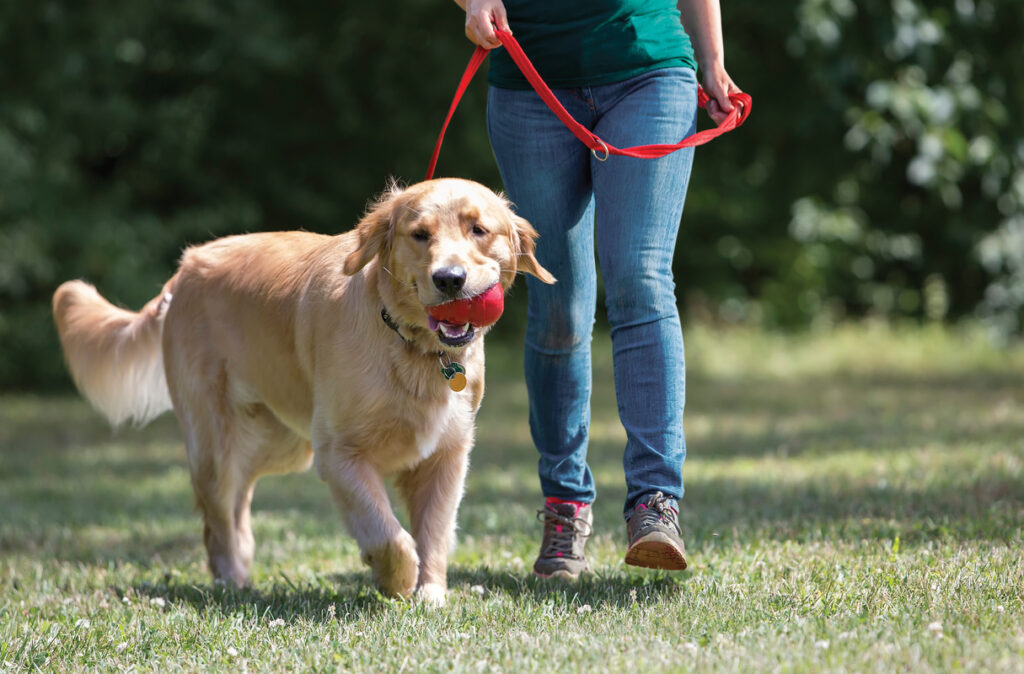From Chihuahuas to Pit Bulls, any kind of dog can experience boredom. Dogs have innate instincts — like chewing, sniffing, or herding — that they inherited from their wolf ancestors. When these natural traits are stifled, dogs may become bored, potentially resulting in undesirable behaviors.
If you suspect your dog might be bored, review the common signs below and help your dog become actively engaged once more.
1. Engaging in Destructive Behaviors
When you first bring your dog home, there are bound to be some growing pains. While your pet is learning the lay of the land, they will probably slip up from time to time. However, if your dog suddenly begins to chew on furniture, shoes or dangerous items like wires, something is wrong.
There are a few common destructive behaviors that bored dogs do. These include, but are not limited to:
- Chewing everything that they can get their teeth on
- Excessive digging
- Compulsive chewing or licking their paws
- Improper elimination, “forgetting” their potty training
At best, these behaviors are annoying for pet parents. At worst, these dog behaviors can even become dangerous. Chewing on wires or small objects that are a choking hazard could be a real threat.
2. Making Escape Attempts
At the point that your dog becomes well and truly bored, they might even try to run away. This could happen because your pet is no longer mentally stimulated by their surroundings. As a result, they are now in pursuit of greener and newer pastures to explore.
When you open the door, does your dog regularly try to make a run for it? This is likely off-putting at the moment and might lead to you being more careful about entering and exiting. Beyond just that adjustment, the underlying cause for this pattern should be addressed with increased stimulation or speaking with an animal behaviorist.
3. Constant Whining or Barking
When our dogs whine, there are two main reactions commonly seen in dog parents:
First, they might feel bad for their poor pup. Then, it is also possible that a dog’s unceasing whining for no apparent reason might become slightly unsettling.
No matter which reaction you are more likely to experience, you should identify the source of your dog’s whining. Maybe you have food that your dog desperately wants, or their favorite toy slipped to the no man’s land of “too far under the couch.”
It is also possible that they are experiencing a severe case of dog boredom and need your help to relieve it.
Some dogs are not whiners and opt to bark at you for prolonged periods. Although the noise is different, the cause and effect are the same. Your dog is trying to get your attention for one reason or another.
4. Sleeping Almost All Day and Night
We all have those days when we have trouble dragging ourselves out of bed. Perhaps we did not get enough sleep the previous night. On the other hand, the warmth of the blankets can be incredibly enticing. Regrettably, we have responsibilities that must be tended to, so we eventually have to get out of bed.
Our dogs can sleep the day away. We might even feel just a little jealous of our pets sometimes for having this ability at times. That being said, if your dog starts sleeping more than usual, they might be feeling overly bored.
Dogs get just over ten hours of sleep per day, on average. Your dog might get a slightly different amount of rest (especially for certain age groups or those fighting illness).
Canines can range from little under seven to 16 hours of sleep per day. When you consider that people are encouraged to hit seven to nine hours, you might feel just a tad jealous.
If your dog is sleeping a lot, even considering outside factors, an investigation is warranted.
5. Displaying Excessive Amounts of Energy
On the opposite side of the spectrum, we see dogs with boundless energy. Whether a bored dog is a sleeper or more hyperactive will simply depend on their personality.
Consider their typical demeanor. Are they generally more excitable, or do they love nothing more than a nice snuggle on the couch?
It should go without saying that some dogs are more energetic than others. Once enough time passes with your pet in your life, you will become accustomed to their usual energy levels. Since you know what is normal for your dog, it should be fairly easy to identify what is abnormal.
We all love when our dogs greet us at the door when we come home. Their enthusiasm puts a perfect punctuation onto the end of a workday, and it is finally time to relax. If your dog appears to be driven into a sustained frenzy, refusing to stop jumping or barking long after you return, something is amiss.
Maybe their energy isn’t quite so manic but is still notably disrupted. Perhaps, your dog isn’t holding to your established bedtime routine and is wandering the halls. If your dog refuses to relax in their crate or bed and exhibits signs of restlessness and anxiety, it might be a symptom of canine insomnia.
6. Never Leaving Your Side
In general, many of us will find it cute and sweet when our dogs keep us company throughout the day.
It is not at all abnormal when your dog exhibits interest in you and wants to be around you. This signifies a healthy bond and a significant amount of trust that you have built up together. Meanwhile, being glued to each other all day, every day, is indicative of a deeper problem.
If this is happening to you and your dog, it is possible that they are experiencing significant amounts of boredom or even separation anxiety. Beyond that, your dog sees you as the solution to their problems.
This makes sense, as the bond between humans and dogs is a long one made of domestication and mutual understanding. There is absolutely no doubt that the bond between people and their canine companions is as strong as ever.
Yet, there does come the point where it becomes a cause for alarm, and it’s time for human intervention.
How Can You Fix Your Dog’s Boredom?
Now that we know some common signs of boredom in a dog, here are some tried and true boredom busters.
Give Them Mentally Stimulating Toys
If your dog is bored, it is likely because they require mental stimulation or physical stimulation. Toys can be the perfect solution to both of these issues. The KONG Classic is so classic for a reason, and that is because dogs can’t seem to get enough.
The KONG Classic is an interactive toy that can be tossed or filled with treats, kibble, and spreads (peanut butter, anyone?). Either way, your dog is sure to spend time entertained by this delightful toy.
If your dog is a big chewer, then chew toys might be just what the veterinarian ordered. The stuffed KONG Classic works great for that too, but so does the Biscuit Ball since they are both puzzle toys.
Get Them Enough Physical and Mental Exercise
Toys can help with this as well, but it might be time to expand your dog’s exercise regimen. Your dog needs physical and mental exercise.
Generally, dogs under 15 months tend to get two daily walks. Whether or not that is enough will depend on the dog, the length of the walk, and other considerations.
However, your dog might be craving more variety to burn off their excess energy. Maybe you could enhance playtime with a frisbee or interactive games. Boredom in dogs can also be attributed to a lack of socialization. Consider play dates with a fellow dog, try out some local dog parks, or enroll your pet in doggy daycare!
Teach Them Some Tricks or Commands
Training sessions are an excellent way to stave off boredom in dogs. Dog training enhances your bond together, teaching you and your dog some new tricks! KONG treats are a great tool for training.
Dog Wellness: Fun and Games (and Careful Care)
A tired dog is a happy dog, so be sure to provide them with all of the stimulation that they need throughout the day. We can’t all be dog trainers and pet behaviorists, but with the right resources and guidance on dog wellness, we can help our dogs live their best lives.
Sources:
Sleep in the Dog: Comparative, Behavioral and Translational Relevance | ScienceDirect
Dog Walk Frequency and Duration: Analysis of a Cohort of Dogs Up to 15 Months of Age | ScienceDirect
Dog with insomnia gives her owners sleepless nights | The Washington Post



